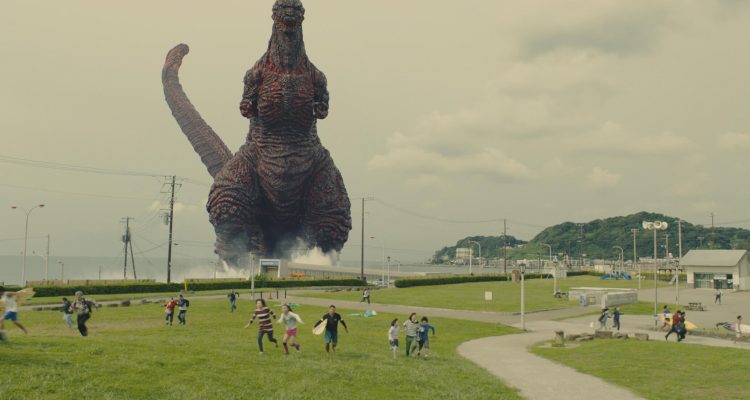Ironically, the best Godzilla movies focus more on the humans than the giant, radioactive nuclear sea monster destroying Japan (or, occasionally, various cities in the U.S.). The original 1954 classic, as it is well known, is a social commentary on the state of the island country (and, in some cases, the world) post-Hiroshima. It was a literal monster to make sense of daily monstrosities. Gareth Edwards’ recent 2014 film didn’t quite have the same political backbone, but it succeeded in retaining the humanitarian approach that was slowly fading when Godzilla’s frenemies like Mothra, King Kong, and King Ghidorah shared the posters and titles. Thankfully, that tradition is continued once again in “Shin Godzilla” aka “Godzilla: Resurgence,” the first Japanese addition to the franchise since 2004’s “Godzilla: Final Wars.”
Toho Studios’ third reboot in the franchise, “Shin Godzilla” might perhaps be the most realistic Godzilla movie ever made. Diplomatic, strategic, and unconventionally subdued, beyond the repentant destruction of various Japanese cities and landmarks, writer-director Hideaki Anno (creator of “Evangelion”) and co-director Shinji Higuchi (the recent live-action “Attack on Titan” films) cleans the slate and presents a stern, bleak and almost emotionally bankrupt monster movie. It might seem unbecoming on paper, perhaps, but the idiosyncratic approach — for this crowded genre, at least — restores the roots of the original with a fresh, satirical and intelligent angle. Focused and assured in its nuts-and-bolts ways, it’s as if Steven Soderbergh decided to make a Kaiju film, and the results are thought-provoking and often darkly comedic. It’s unexpectedly winning, if not without some expected drawbacks.
 As an allegory for the Fukushima Daiichi nuclear disaster and the 2011 Tohoku earthquake and tsunami, “Shin Godzilla” is certainly more toned-down, message-driven and subsequently meaningful than your past few Gojira titles. Now, not everything needs to be directed toward an American audience, but the very specific social commentary might not hit quite as hard globally. Hopefully I’m wrong, though. This is a film guided by perception and insight, presenting a purposeful, gritty, and well-written entry into the canon, but its emphasis on politics sometimes sees the film losing its human touch.
As an allegory for the Fukushima Daiichi nuclear disaster and the 2011 Tohoku earthquake and tsunami, “Shin Godzilla” is certainly more toned-down, message-driven and subsequently meaningful than your past few Gojira titles. Now, not everything needs to be directed toward an American audience, but the very specific social commentary might not hit quite as hard globally. Hopefully I’m wrong, though. This is a film guided by perception and insight, presenting a purposeful, gritty, and well-written entry into the canon, but its emphasis on politics sometimes sees the film losing its human touch.
Most of the characters serve as chairs to fill in boardrooms and government offices, which makes it hard to get completely invested in the destructive on-screen actions. Their decision-making is often sound, all things considered, but we’re left a little too distant. That human element gets subtracted significantly, and it sadly makes “Shin Godzilla” just a little too stiff and stuffy for its own good. There are points where you forget you’re watching a Kaiju film, which could seem like an elevation of the form, but that’s not always the case. The action sequences themselves are pretty good, particularly since the VFX effects are the second-best to be found in the franchise ever, behind Edwards’ recent Hollywood effort, yet don’t forget to pay ample homage (via sound cues and visual nods) to their campy predecessors.
 At a straight two hours, “Shin Godzilla” is a touch too long, and perhaps a little too self-important, for its own good. It’s like the film goes out of its way not to have fun at times. But at a time when our own political system is playing out as a farce, seeing Godzilla restore some order throughout the chaos has some resonance. “Shin Godzilla” ushers in a new age for Godzilla, and a welcome one at that. It’s not perfect, but it’s ready to ask big questions and also demand thoughtful answers. In that sense, it’s one of the most valuable Godzilla movies to come along in years, decades even. Perhaps ever. And that feels very fitting to its fire-breathing, laser-shooting, city-pummeling but ultimately human roots. [B-]
At a straight two hours, “Shin Godzilla” is a touch too long, and perhaps a little too self-important, for its own good. It’s like the film goes out of its way not to have fun at times. But at a time when our own political system is playing out as a farce, seeing Godzilla restore some order throughout the chaos has some resonance. “Shin Godzilla” ushers in a new age for Godzilla, and a welcome one at that. It’s not perfect, but it’s ready to ask big questions and also demand thoughtful answers. In that sense, it’s one of the most valuable Godzilla movies to come along in years, decades even. Perhaps ever. And that feels very fitting to its fire-breathing, laser-shooting, city-pummeling but ultimately human roots. [B-]

